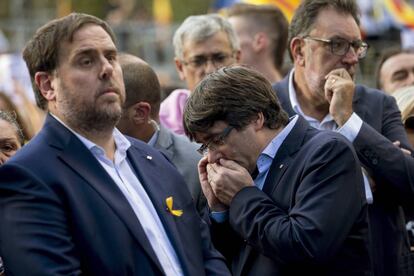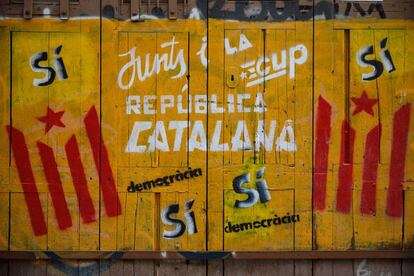Catalan leader weighs Senate appearance over emergency measures
Carles Puigdemont is ignoring suggestions to stop activation of Article 155 by calling early elections

Catalan premier Carles Puigdemont is considering appearing before the Senate committee that will handle the Spanish government’s proposal to temporarily intervene the region’s affairs.
The Spanish Senate, which must give the final go-ahead to the measures approved by the Cabinet last Saturday, has offered Puigdemont the chance to appear before the committee on Thursday afternoon, or else at the plenary session scheduled for Friday.
It is within his reach, and nobody else’s, to prevent 155 from being applied
Oscar Puente, PSOE spokesman
On Saturday, Spanish Prime Minister Mariano Rajoy announced the measures that his Popular Party (PP) administration has drafted with support from the Socialist Party (PSOE) and Ciudadanos to “restore the law” in the breakaway region.
The measures, which include removing Puigdemont and his entire governing team from their posts and calling new elections in the region within the next six months, are the result of invoking Article 155 of the Spanish Constitution. This provision, which has never been used since the Constitution was signed in 1978, allows the central government to take “the necessary measures” to compel regional authorities to obey the law.
The PSOE on Monday told Puigdemont that Article 155 can still be avoided if he “returns to legality” and calls an election of his own free will. “It is within his reach, and nobody else’s, to prevent 155 from being applied,” said Oscar Puente, spokesman for the party executive. “We are asking him to restore constitutional order.”

But so far the Catalan leader has shown no indication that he is going to do so. Catalan authorities have already scheduled a plenary session of their own at the regional parliament on Thursday and Friday to debate “the liquidation of our self-government.” The decision to hold this session was adopted following a petition by Junts pel Si, the governing coalition in Catalonia, and its ally party CUP. Together, these pro-independence groups hold a majority of 72 seats in the 135-seat chamber.
Junts pel Si and CUP want to hold a two-day debate inside the Catalan assembly, to be followed by a vote and the possibility of Puigdemont formally declaring independence. This event would coincide in time with the Spanish Senate’s own vote to greenlight the emergency control measures.
Xavier García-Albiol, the head of the PP group inside the Catalan parliament, warned that his group will not participate in any vote that could lead to a declaration of independence. He also insisted that the emergency measures are not aimed at “cancelling or suspending Catalan self-government” but, on the contrary, at “restoring it” after being abused by separatists in recent years.
EU backing
The European Commission said that the measures adopted by the Spanish government on the basis of Article 155 of the Constitution “respect Spain’s constitutional and legal order,” said Margaritis Schinas, spokesman for EC President Jean-Claude Juncker.
Felipe González, who was Spain’s longest-serving head of government and steered the country into the European Community, said that “Article 155 is as constitutional as Articles 1 and 2” and that it is Catalan authorities who have “violated and stepped over” regional autonomy with their breakaway laws.
Lluís Corominas, speaker of Junts pel Sí in the Catalan parliament, has so far avoided using the word independence, and has instead stated that the plenary session will serve to “provide an answer to the aggression involved in the application of Article 155.”
The assembly’s legal team has been instructed to adopt all available legal action against the Spanish Cabinet’s decision. Corominas has stated that the agreement to adopt emergency measures in Catalonia is even subject to criminal prosecution; he has accused the Spanish government of practicing “institutional, police and judicial violence” against Catalonia.
“Spain is acting like a dictatorship that imposes the law through judges, prosecutors and the police,” he said, describing Catalonia as “occupied for weeks now” by members of the Civil Guard and National Police stationed in the region since before the referendum of October 1.
Meanwhile, the anti-capitalist CUP has announced a week of “non-violent struggle” to show opposition to Article 155, which it considers an aggression against the pro-independence majority in the Catalan parliament and against Catalan citizens as a whole. There will be “a response in the form of massive civil disobedience by citizens,” warned the CUP.
English version by Susana Urra.
Tu suscripción se está usando en otro dispositivo
¿Quieres añadir otro usuario a tu suscripción?
Si continúas leyendo en este dispositivo, no se podrá leer en el otro.
FlechaTu suscripción se está usando en otro dispositivo y solo puedes acceder a EL PAÍS desde un dispositivo a la vez.
Si quieres compartir tu cuenta, cambia tu suscripción a la modalidad Premium, así podrás añadir otro usuario. Cada uno accederá con su propia cuenta de email, lo que os permitirá personalizar vuestra experiencia en EL PAÍS.
¿Tienes una suscripción de empresa? Accede aquí para contratar más cuentas.
En el caso de no saber quién está usando tu cuenta, te recomendamos cambiar tu contraseña aquí.
Si decides continuar compartiendo tu cuenta, este mensaje se mostrará en tu dispositivo y en el de la otra persona que está usando tu cuenta de forma indefinida, afectando a tu experiencia de lectura. Puedes consultar aquí los términos y condiciones de la suscripción digital.








































